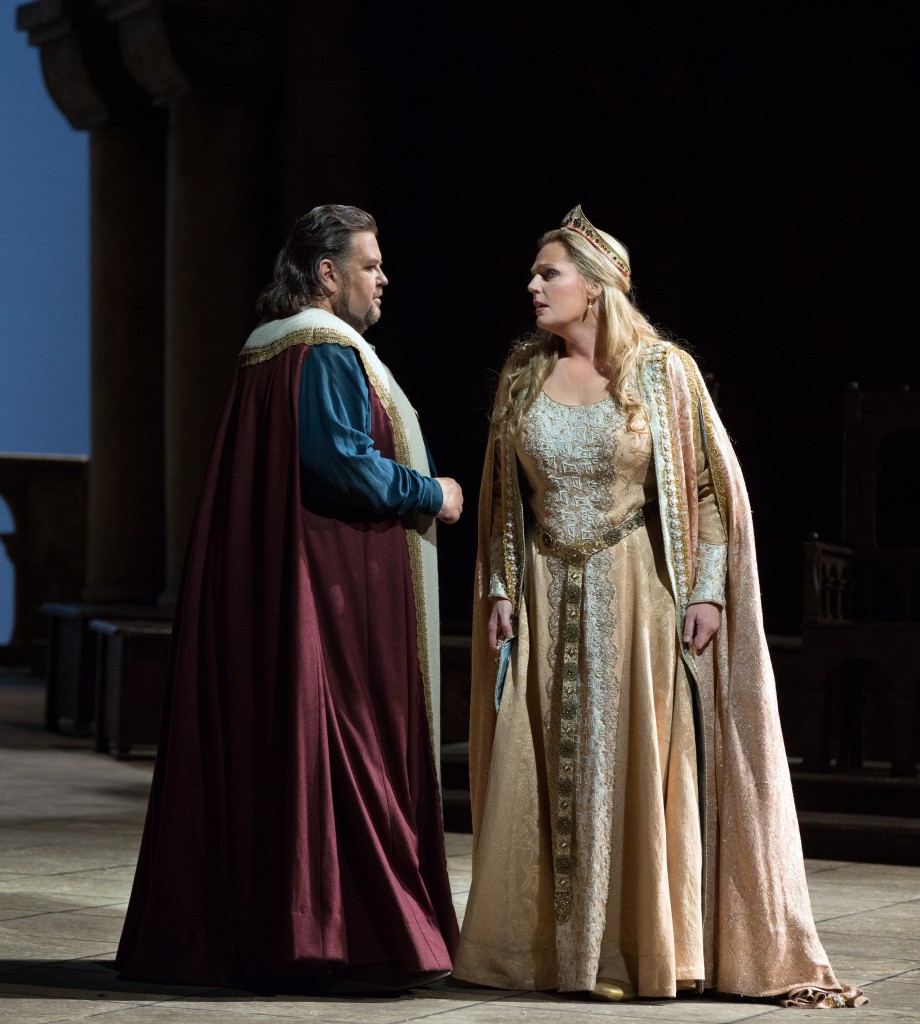Magnificent cast makes Met’s “Tannhäuser” a Wagner night to remember

Johan Botha and Eva-Marie Westbroek in the Metropolitan Opera production of Wagner’s “Tannhäuser.” Photo: Marty Sohl
The Metropolitan Opera’s revival of Tannhäuser is a significant success, but a perverse one. A great opera put on stage with a combination of indifference and superficiality would normally be a failure. But when sung and played as beautifully, richly, and musically as is this, the magnificence of Tannhäuser comes through.
Otto Schenk’s production debuted in 1977, and hasn’t been presented at the Met for a decade. It’s pluperfectly mediocre: robes, gowns, swords, gothic landscapes and interiors, all tasteful, all bland. The production illustrates the story without offering any illumination or ideas.
Inside Venus’ dank grotto, the forest, the meeting hall of the Wartburg castle, the direction from Stephen Pickover is active, natural, and fluid. As dated as the production feels, there are no concessions to park and bark blocking. The simple movements and interactions of the singers are enough to humanize the characters, crossing the line between staged concert and opera.
It is strange to contemplate how inconsequential that all turns out to be. The singing and orchestral playing simply overpower every inadequacy of the production. Everyone in the cast is no less than excellent, and there were moments and performances that could not be better.
Singing the title minstrel knight is tenor Johan Botha. His voice is piping and substantial, and he has the stamina, and the ease in his upper register, for the role. He may not have the dark weight ascribed to the quasi-legendary heldentenor voice, but there’s nothing to quibble about.
Botha sang the character’s long lines with exceptional breath control and phrasing. He’s not a great actor, but he has charisma on stage, and the voice did the rest. His musical degrees of emotion all through the refrains of “Dir töne Lob!” was wonderful, especially as he maintained a constant legato, making the expressive modulations a matter of subtle shadings along a spectrum. He used his voice all night to differentiate between the character’s conflicting desires.
Mezzo-soprano Michelle DeYoung is Venus, and she seemed to relish the role, singing with lustrous, and lusty, power. She and Botha were intense and involving together in the Venusberg scene, and her ability in her role matched his. One hears the start of “Geliebter, sag” with an uneasy curiosity—can the singers get through this exhausting stretch without mishap? Botha and DeYoung set one at ease immediately.
The most powerful voice onstage was that of soprano Eva-Maria Westbroek, who sang Elisabeth. Her G in the opening phrase of “Dich, teure Halle” filled the house. Her voice has the richness usually heard with mezzos, with a soprano’s shine, and throughout the night, her instrument had more presence than any other, including those in the pit.
Westbroek’s vocal strength made for an equally strong character, a fully realized woman, rather than a girl. When she steps in front of Tannhäuser’s fellow minstrel knights, their swords drawn and ready to cut him down for his sins of sex and paganism, her authority and command are substantial and stunningly dramatic.
Just about stealing the show is baritone Peter Mattei as Wolfram. Mattei continues to turn in one remarkable performance after another at the Met, and the music for Wolfram not only sits well for his voice, but seems to speak to him as a musician. Mattei’s voice is both pure and beautiful and his phrasing was simple and unadorned in a way that sounded perfect. His “Blick ich umher” was lovely and charming, and the epitome of his art was exemplified in Act III: the first line of “Wohl wußt’ich” descends to a cadence on B-flat, and Mattei’s attention to motion, to gradually adding musical weight that would finally settle on that note, was full of expression and meaning.
James Levine led the singers and orchestra in a warm yet driven performance. Levine’s pace was excellent and well-modulated throughout, pushing forward when the emotions were agitated and high, laying back with what felt like exquisite timing and attention to the large-scale form Act III. The orchestral playing throughout Act III was exceptionally lyrical and vocalized. The Act I Overture was full, with just a touch of weight held back, and Levine delivered that portion right at the end, where Wagner’s marvelous combination of hymn and fanfare was plangent and moving.
Levine gave every singer the opportunity to shine, and all were brilliant in turn. Soprano Ying Fang was bright in the small part of the shepherd, and bass Günther Groissböck sang the role of Hermann with a vibrant vocal presence, full bass color and perfect intonation without heaviness. The chorus made a blended sounded throughout that matched the warmth of the orchestra, and Levine balanced dynamics and ensembles expertly—everything came through.
The Met is using the Paris version of the opera, which has essentially become the standard, which means the Venusberg music and the orgy of fairies and nymphs just after the opening curtain. This is displayed by a complement of dancers moving in the semi-shadows of the grotto—the choreography is by Norbert Vesak—and climaxes in some cheerleader-esque acrobatic coitus.
If the rest of the performance showed that kind of imagination, this would be a Tannhäuser for the ages. As it is, with this cast it’s sung like one.
Tannhäuser continues through October 31 metopera.org
Posted Oct 13, 2015 at 7:46 am by Keith Christiansen
You are dead wrong about this magical, if now somewhat aged, production. The concept is Wagner’s. Spare us the bathos of trendy directors. The transformation of Venusberg to the landscape takes us right into a German 19th c painting. And the lighting in the last scene is magical.